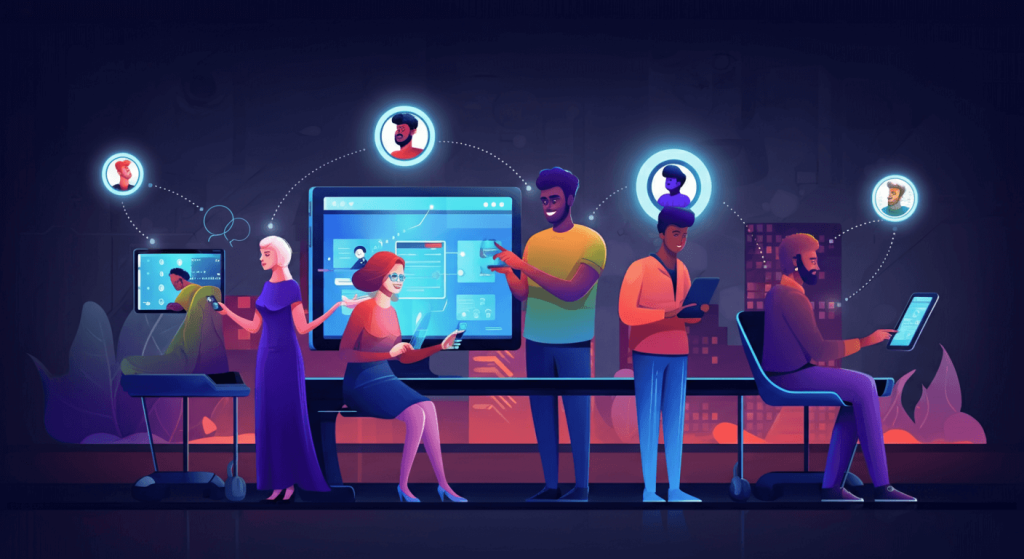Online communities have become an integral part of the digital age. Whether you’re seeking like-minded individuals who share your hobbies, professional networks to accelerate your career, or forums to exchange knowledge, online communities are bridging gaps in ways previously unimagined.
But these digital hubs go far beyond casual chatting. They foster connection, support growth, and influence larger societal changes. This blog will explore the vital role online communities play in today’s world, from encouraging collaboration to amplifying diverse voices.
The Power of Connection in a Digital Sphere
Human Connection Without Boundaries
One of the most impactful roles of the online community is its ability to serve as a bridge for individuals across geographical and cultural differences. Regardless of location, individuals can join forums, social media groups, or niche interest sites and build meaningful relationships with others who share their experiences or passions.
For example, platforms like Reddit connect millions of users through “subreddits” that cater to topics ranging from gardening hacks to astrophysics discussions. These connections mean that someone in Paris can exchange advice on plant care with someone in Tokyo, globalizing even the most specific interests.
Online communities also serve as a haven for those who may feel isolated in their immediate surroundings, such as individuals in niche fandoms or those facing social stigmas.

Building Support Systems
Digital communities are vital support networks, particularly in areas such as health, mental wellness, and personal challenges. Forums like Inspire or groups on platforms like Facebook bring together individuals living with chronic illnesses, caregivers, or those navigating life-altering circumstances.
These digital support hubs enable people to share experiences, give advice, and offer emotional encouragement, creating an invaluable lifeline for many. The camaraderie within these spaces is a testament to the online community’s ability to foster empathy and mutual care.
Amplifying Diverse Voices
Online communities empower minority groups and marginalized voices, giving them platforms to share their stories, advocate for change, and educate others. Social media movements such as #MeToo and #BlackLivesMatter gained traction through collective action in digital spaces by rallying individuals worldwide to raise awareness and push for justice.
Here, tradition-defying conversations thrive, enabling marginalized voices to access audiences that, otherwise, they might not reach.
A Catalyst for Growth and Knowledge Sharing
Crowdsourcing Innovation
Online spaces unlock unique opportunities for collaboration and creativity. Platforms like GitHub allow developers to crowdsource ideas and projects, leading to groundbreaking developments and open-source tools. Similarly, online marketplaces like Etsy connect creative entrepreneurs with audiences eager for one-of-a-kind products.
By inviting diverse expertise and perspectives, online collaborations often spark innovation more efficiently than traditional in-person gatherings.
Education Beyond Borders
Communities with educational missions are breaking barriers to knowledge. From Stack Overflow, which lets developers troubleshoot code, to Coursera groups formed around shared learning goals, these platforms make education more accessible than it’s ever been. Whether it’s learning a new language, gaining coding skills, or mastering a cooking recipe, there is an online community tailored to every learning need.
Not only does this democratize education, but it also turns learning into a community-oriented activity, helping individuals to stay motivated while honing their abilities.
Professional Advancement
For professionals, online communities are vital tools for innovation and networking. Sites like LinkedIn or industry-specific Slack groups connect professionals on a global scale, giving them access to mentors, collaborators, and job opportunities.
These communities allow industry professionals to exchange best practices, attend virtual conferences, and stay ahead of trends, ultimately helping them to excel in their careers.
Challenging the Norms
Advocacy and Cultural Change
Online communities have played a monumental role in advocacy over the last decade, challenging social norms and reshaping societal conversations. Whether they are rallying for climate action, petitioning governments for legislation, or simply raising awareness about crucial issues, these communities demonstrate the power of collective voice.
Take Change.org, a platform that enables individuals globally to start petitions and bring attention to critical issues. Countless initiatives have gained traction through this platform, showing the ability of like-minded digital citizens to enact tangible change.
Encouraging Accountability
Influencers, brands, and even governments are more accountable today, thanks to the reach of online communities. Public sentiment voiced on platforms like Twitter or Instagram can shape corporate behavior, from pressuring brands to reduce environmental harm to advocating for ethically sourced goods.
Reviews, forums, and social chatter contribute to transparency, ensuring that individuals and businesses operate with integrity under the watchful eye of their digital communities.
The Challenges of Online Communities

While their role is undeniably impactful, online communities are not without challenges.
Disinformation and Echo Chambers
One downside to the interconnectedness of online spaces is the risk of spreading misinformation. Without proper checks, online communities can amplify false information or controversial ideologies. Additionally, “echo chambers” may emerge when individuals are surrounded only by like-minded people, which can limit critical thinking and nuanced conversations.
Digital Burnout
Over-reliance on online communities may also lead to digital burnout. With constant access to virtual spaces, individuals may feel overwhelmed by the never-ending flow of information or community obligations, underscoring the importance of balancing online and offline lives.
Ensuring Inclusivity
Another challenge is ensuring that digital communities are inclusive and respectful. Moderation, proper policies, and clear community guidelines play an essential role in maintaining the integrity and diversity of these spaces.
Creating Stronger Digital Communities
For those who manage or participate in online communities, several measures can enhance their effectiveness and inclusivity:
- Establish Clear Rules: Community guidelines that encourage respect and constructive participation help keep discussions positive.
- Foster Member Diversity: Actively work to include a variety of voices and perspectives. Diverse communities are richer in ideas and experiences.
- Promote Digital Literacy: Educate members on verifying sources and identifying disinformation to improve the quality of discussions.
- Support Interaction: Activities like AMAs (Ask Me Anything), webinars, or group challenges can strengthen connections among members.
Where to Go from Here
Online communities are more than places for connection; they are hubs for collaboration, learning, and advocacy. Whether they’re changing cultural narratives or helping someone brew the perfect cup of coffee, their role in society is profound.
For businesses, professionals, and individuals, online communities offer unique opportunities to connect, learn, and grow. In particular, community building in education plays a vital role in creating supportive learning environments that foster collaboration and student success. By nurturing these spaces and addressing the challenges they face, we can ensure they continue to thrive and positively impact society.





